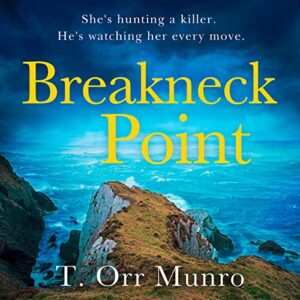I write Mondays to Wednesdays from 9am until around 4 or 5pm. Occasionally I’ll write at other times but I find the distance of just a few days useful for honing ideas.
A bit about you.
I live in North Devon where I also grew up. I’m a freelance journalist, specializing in writing about policing, but, a long time ago, I was a CSI or Scenes of Crime Officer as they are also called.
What you have written, past and present.
I’ve a rather eclectic back catalogue! I’ve written a YA novel, ghostwritten the memoirs of a Battle of Britain pilot and a children’s history of Devon. I also have around five unpublished novels in my bottom drawer! I’m currently writing my second crime novel.
What you are promoting now.
Breakneck Point is my debut crime novel out in April about CSI Ally Dymond who is redeployed to a Devon backwater after blowing the whistle on police corruption, but the sleepy coastal town of Bidecombe doesn’t turn out to be quite as quiet as she anticipated.
A bit about your process of writing.
I’m quite disciplined about writing. I think it comes from being a journalist and having to sit down and write even when I don’t always feel like it. I’m a ‘reviser’ rather than someone who aims to get it right first time which means that it is sometimes hard to know when to stop.
Do you plan or just write?
I’m a planner. I try to plot the entire book out before I start although it invariably changes. However, it means that I tend to know what I’m going to write before I switch my laptop on. I don’t write linearly either. I’ll often write a scene in a different part of the book because I’ve had a particular idea or I’m in the mood to do it. My head has to be in the right place to write difficult scenes, usually 3.00am in the morning when I can’t sleep.
What about word count?
I don’t set myself daily word counts. It’s too much pressure! I’m also one of those writers who underwrites and struggles to get enough words down on the page rather than one that writes too many and has to cut back. I dream of writing too many words! It’s a constant challenge for me. I blame starting out as a print journalist where I would constantly look to strip out words so the story would fit the page. Old habits die hard.
How do you do your structure?
My books often just start with an image which I then work into a story. For instance, I’m writing book two in the CSI Ally Dymond series and that began life as a single scene which happens towards the end of the book. I do use various reference books. I’m a bit of a magpie, taking the bits that work for me, but I find them helpful for getting me over a plotting blip. I regularly dip into Creating Character Arcs by K.M. Weiland. Save the Cat Writes a Novel by Jessica Brody is good for checking that I’m on the right track and I quite like the approach taken in Book Architecture by Stuart Horwitz.
What do you find hard about writing?
Finding myself hurtling down a blind alley! It’s that horrible feeling in the pit of your stomach when you know something isn’t working, but you can’t work out what and you’ve already written thousands of words that you also know are probably going to wind up in the trash. It’s when I come closest to giving up altogether.
What do you love about writing?
As soon as I learnt to read I was utterly enthralled by words and how they could be used to transport me to other worlds. When I learnt to write, I realized I too could use words, but to create my own worlds. I get to play god, basically!

